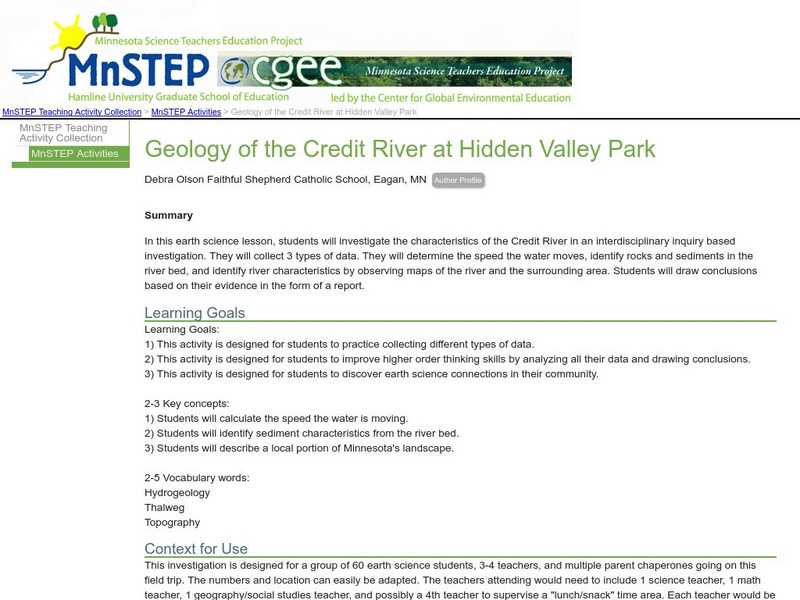Hi, what do you want to do?
Curated OER
Sedimentary Size and Structures
Learners interpret the Earth's history from models. In this investigative lesson students create sedimentary deposit models.
Science 4 Inquiry
Edible Plate Tectonics
Many people think they can't observe plate tectonics, but thanks to GPS, we know that Australia moves at a rate of 2.7 inches per year, North America at 1 inches per year, and the Pacific plate at more than 3 inches per year! Scholars...
Science 4 Inquiry
Carbon and Climate
The carbon cycle is natural and has happened for millions of years, so can humans change it? Young scientists play the role of carbon as they travel through the carbon cycle. They complete two rounds, once before the industrial...
Curated OER
What is a Karst
Students investigate landforms by holding a class experiment. In this topography lesson, students define the word "karst" and discover why sinkholes are created on the surface of the Earth by completing worksheets. Students create a...
Science 4 Inquiry
Let's Get Moving
Rivers top the list of causes of erosion over time. Scholars experiment with wind, water, and ice reshaping sand. They connect the simulations facts about erosion and deposition to understand unique landforms such as the Grand Canyon and...
Curated OER
What Is Natural?
Your junior highers will learn about which objects are natural and classify objects as abiotic or biotic. Your class will trace human products to their natural resources using matter cycles and then create their own definition of nature.
Cornell University
Classification
Explore the scientific method of classification. An interactive activity asks learners to create a classification system for a group of objects and develop a flow chart to communicate their systems. In addition, individuals use a...
Curated OER
What's Under There?
Learners determine ways to make "observations" about unknowns, such as the land beneath an ice sheet or the interior of the Earth, using tools other than sight. They build "mystery boxes" and exchange them with other groups to "map"...
Curated OER
Chemical Weathering
Learners measure the effect of water temperature on the rate of a chemical reaction, similar to the interaction of a weak acid and carbonate rock, using hot water and effervescent antacid tablets.
Curated OER
What is a Karst?
Learners examine the process that creates limestone. In this limestone lesson students complete a worksheet and participate in a lab activity.
University of Colorado
Are All Asteroids' Surfaces the Same Age?
There are more than 600,000 asteroids in our solar system. Pupils analyze images of two asteroids in order to determine if they are the same age. They count craters for each asteroid and compare numbers.
Consortium for Ocean Leadership
Nannofossils Reveal Seafloor Spreading Truth
Spread the word about seafloor spreading! Junior geologists prove Albert Wegener right in an activity that combines data analysis and deep ocean exploration. Learners analyze and graph fossil sample data taken from sites along the...
Curated OER
Reopen: A Study of Five Closed Mines
Students analyze data to determine which of the fived closed mines would be beneficial to have reopen. They acquire knowledge of rocks and minerals in the area to give reasons why that mine should open again. Students gain knowledge in...
Curated OER
Sediment Tubes
Students observe how different density soils and rocks behave in wind and in water. They make predictions and careful observations as they explore sediment transport and sediment rates in streams and rivers.
Curated OER
Aerology- The Study of Mars
Learners investigate various aspects of the planet Mars. They examine a core sample that is simulated to make observations. Then compare the known sample with one that is unknown and differentiate between the two. Students hypothesize...
Curated OER
How Old Is Mike?
Students examine the absolute dating of fossils, they use a list of names and ages to determine the difference between relative age and absolute age. They explore the relative age and absolute age of people and of fossils.
Curated OER
Areology-The Study of Mars
Students examine core samples from Mars and discover what they can use it to tell the history of Mars. In this core sample lesson plan students create and analyze their own core samples then eat them at the end.
Curated OER
Volcano!-Thar She Blows!
Students describe how volcanoes are formed. They name the types of boundaries where volcanoes occur. They utilize models to illustrate the occurence of volcanoes and earthquakes along plate boundaries. They compare and constrast the...
Curated OER
Asteroids
Students examine a potential asteroid impact site. They describe evidence and theories for extinction events.
Curated OER
Formation of Rain
Students sequence the steps leading to the formation of rain, and design a model to represent these steps. This task assesses students' abilities to classify, generalize, infer, interpret and communicate data, and construct a pictorial...
Curated OER
Water Pollution
Students study four samples of "rain water". They asked to determine the pH of the samples and then to neutralize them. Students are asked to predict any negative effects which might be associated with water having a low pH and to...
Curated OER
Interdisciplinary Task: Weather
Students design a chart to use to record the weather for five days. They then build an anemometer to record wind speed and discover why they are used for this purpose.
Science Education Resource Center at Carleton College
Serc: Geology of the Credit River at Hidden Valley Park
In this earth science lesson, students investigate the characteristics of the Credit River in an interdisciplinary inquiry based investigation. They will determine the speed the water moves, identify rocks and sediments in the river bed,...



























